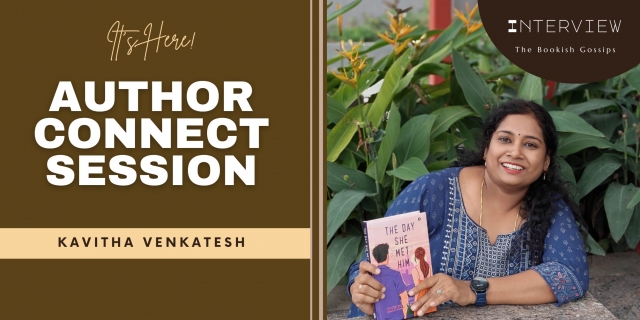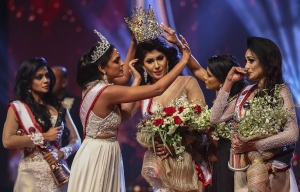There are stories that you write, and then there are stories that write you. Kavitha Venkatesh would agree. Her debut novel, The Day She Met Him, feels like one of those stories that found her rather than the other way around. And as you turn each page, you can tell, it's personal. It's raw in all the right places. It's fiction, yes, but wrapped in something real.
In this intimate interview hosted by Unnati Shahi, the founder of The Bookish Gossips, Kavitha opens up about her writing journey, the emotional layers behind her debut, and how intuition often guides her hand more than any plan ever could. What follows is not just a conversation about one book. It's a quiet unveiling of what it means to be a writer who listens closely—to the world, to people, and to herself.
From Childhood Wonder to College Scribbles
Some writers start with ambition. Others start with a notebook and a giggle. For Kavitha, the seed of storytelling was planted early. She was always drawn to stories, whether hearing them or reading them. The habit of imagining narratives began in childhood, but it wasn't until her college years that the act of writing them down took shape.
What triggered it? Not tragedy. Not existential angst. But mischief.
Kavitha laughs as she recalls the beginning. “I used to pen down small, funny incidents or pranks from college. That's when I felt the joy of capturing a moment in words.”
But the leap from capturing pranks to publishing a full-length novel didn't happen overnight. The author in her took time to awaken. It wasn't until The Day She Met Him began unfolding on the page that she truly saw herself in that role.
“When I realized the story had grown beyond me, when it had its own heartbeat, I knew I was stepping into something more serious. That's when I began to see myself as an author.”
Writing From the Gut, Not the Grid
Every writer's voice matures, but not every writer changes lanes. Kavitha still writes with her instincts in the driver's seat. Early on, she admits, her writing was pure emotion. Unfiltered. Unmapped. Over time, though, she picked up tools. She learned about pacing, dialogue, character arcs. Still, she never abandoned the original spark.
“I'm still an intuitive writer at heart. I might understand structure better now, but I let stories breathe on their own terms. I follow the feeling first.”
It's the kind of approach that lends authenticity to her work. You can sense it in how her characters speak. They don't feel engineered. They feel lived-in.
The Themes That Keep Calling Her Back
Some writers jump from theme to theme, chasing whatever is trending. Kavitha is not one of them. There are certain ideas she keeps circling back to, and she embraces that.
“Human connection is central to everything I write,” she says. “And I find myself drawn to women who voice their opinions strongly, even when it's not easy.”
There's a softness in her tone when she talks about growth and healing. It's clear she doesn't write characters who have everything figured out. She writes people who are figuring it out as they go. People who are trying, failing, and trying again.
“I'm fascinated by how we learn to move forward when life throws us the unexpected. How we make peace with things that didn't go as planned.”
It's a theme that quietly anchors her debut novel.
A Novel That Holds More Than Just Words
When Kavitha talks about The Day She Met Him, she doesn't speak like someone promoting a book. She speaks like someone reflecting on a chapter of her life. Because that's what the novel feels like to her—part story, part soul.
It follows Vidya and Vijay, two people from different worlds brought together by a twist of fate. The book touches on heartbreak, companionship, and the difficult art of letting go. But what makes it stand out isn't the plot. It's the undercurrent.
“This book came from a very personal space,” she shares. “Some of it is imagined. Some of it is observed. And some of it comes from experiences I've lived through.”
That combination makes the story both grounded and layered. It doesn't shout for attention. It holds your gaze quietly and doesn't let go.
A Process Without a Blueprint
Kavitha's writing process doesn't involve detailed outlines or color-coded charts. It begins with something small—a spark, an image, a line of dialogue. From there, it grows.
“I don't plan everything out in advance. I follow where the story takes me,” she says. “Sometimes, the characters surprise me.”
For her, spontaneity keeps the process alive. It keeps her curious. And yet, once the initial draft is complete, she steps back and looks at the big picture. She refines. She trims. She reshapes.
“I trust the first draft to pour everything out. Then I return to it with fresh eyes and start crafting the final version.”
It's a method that marries freedom with discipline, instinct with intention.
Fiction With a Foot in Reality
While her stories are fiction, Kavitha doesn't build them out of thin air. Real-life experiences, observations, and emotions are deeply woven into her narratives.
“The people I meet, the stories I hear, even the silences I witness—they all find a place in my writing eventually.”
Her characters may not be based on real people, but their emotions are. Their decisions. Their regrets. Their fears. That's what gives them depth. They feel like people you could meet on a bus or talk to at a café.
“Real life gives us the richest material,” she says. “You just have to pay attention.”
The Mirror Writing Holds Up
For Kavitha, writing has been more than just storytelling. It's been a mirror. It's shown her things about herself she might not have discovered otherwise.
“It's taught me that I love creating these fictional worlds more than I thought I would,” she says with a smile. “It's also taught me patience. And resilience.”
The process of revisiting drafts, sitting through blank days, rewriting lines that no longer fit—none of it is glamorous. But through it all, she discovered how committed she really is.
“I think I underestimated how much I would enjoy this challenge.”
What People Often Miss About Writers
There's a perception that writers live in a world of inspiration and creativity, sipping tea in charming corners as words flow endlessly. Kavitha quickly clears that up.
“Writing is hard work. It's sitting down even when the words won't come. It's deleting sentences you loved because they don't serve the story. It's second-guessing everything you thought was good.”
She pauses for a moment before continuing. “People often think it's romantic. But it's more like showing up every day to wrestle with your own thoughts.”
It's not a complaint. Just a truth she wishes more people understood.
The Tightrope of Feedback
One of the trickier parts of being a writer is handling feedback. Especially when it doesn't align with your instincts. Kavitha has learned to navigate that space with both openness and trust.
“I try to listen. Feedback often reveals blind spots. It helps me see things from another perspective.”
But at the same time, she's learned not to discard her own intuition too quickly.
“If something doesn't feel right to me, I don't force it. I step away. Then I return later with a clearer head.”
It's a slow, thoughtful process—just like her writing.
When the Doubts Arrive
No creative journey is free from doubt. There are days when the story doesn't move forward, when the voice feels off, when nothing seems to work. Kavitha has her ways of pulling through.
“Talking to close friends helps. Sometimes, just saying things out loud makes them feel smaller.”
She also experiments with perspective. Looks at the story from a different lens. Reads a chapter from another angle. And sometimes, she simply steps away and reads someone else's work.
“Reading helps me reset. It reminds me why I started in the first place.”
And that reminder, more often than not, is enough to bring her back to the page.
Creativity Beyond the Page
For Kavitha, writing isn't the only way to keep the creative fire alive. Life itself offers inspiration—if you know where to look.
“I find ideas in conversations, in travel, in nature. Watching people, observing how they express emotion, how they react to things—that's where a lot of my stories come from.”
Movies also serve as a creative recharge. Not just for entertainment, but for the way they tell stories visually, how they pace a scene, how silence is used as power.
“It all feeds into the way I think about writing.”
Advice for Those Still Finding Their Voice
As we reach the end of the conversation, Unnati asks the one question that lingers on every aspiring writer's mind. What would Kavitha tell someone working on their first draft?
Her answer is gentle, but firm.
“Don't wait for the perfect sentence. Don't wait for the perfect story idea. Just begin.”
She believes that the voice we're searching for doesn't arrive before we write. It arrives because we write.
“The first draft will be messy. That's fine. Your voice will take shape with every paragraph. Every time you sit down, you get a little closer to who you are as a writer.”
It's advice that comes not from a pedestal, but from someone still on the journey herself.
A Storyteller to Watch
Kavitha Venkatesh doesn't shout to be heard. Her voice is steady. Her stories whisper. But they linger long after the conversation ends. With The Day She Met Him, she has offered readers a piece of herself. And with each new story she writes, that offering will only grow deeper, bolder, more nuanced.
She is not chasing trends. She's listening. To herself. To the world. And most of all, to the stories that choose her.
Interview by Unnati Shahi
Founder, The Bookish Gossips






